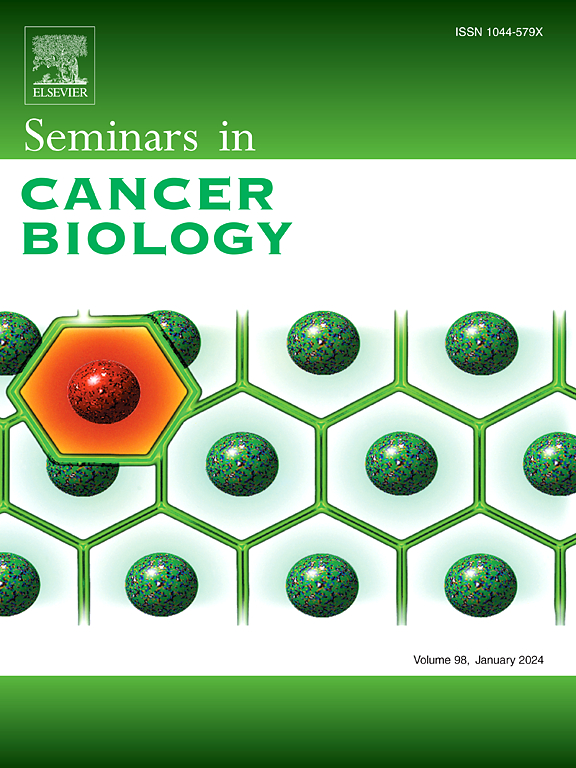肿瘤精准医学时代的克隆进化与耐药
IF 15.7
1区 医学
Q1 ONCOLOGY
引用次数: 0
摘要
儿童癌症表现出由遗传不稳定性、克隆选择、表观遗传重编程和微环境相互作用驱动的复杂进化动力学。肿瘤进化通常以分支系统发育为特征,具有独特遗传谱的亚克隆出现在不同的位置和时间点。部分由于这种多样性,晚期癌症往往对多种治疗产生耐药性,使治疗策略复杂化。这篇综述探讨了在儿童癌症的克隆进化中反复出现的主题,以及进化启发的对抗治疗耐药性的策略。动态决策模型的建议,以适应监测癌症的克隆景观变化的新兴方法和精密药物的扩大曲目。一个更大的药物工具箱将允许更复杂的进化策略来治愈或稳定癌症,使用适应疗法、灭绝疗法和反射控制疗法等方法。然而,在预测和控制癌症演变方面也存在固有的限制-强调需要早期发现,特别是在预测复发的情况下,这不成比例地导致儿童癌症相关死亡率。了解儿童癌症的进化轨迹可以为更有效、个性化的治疗方案提供信息,最终提高年轻患者的存活率和生活质量。本文章由计算机程序翻译,如有差异,请以英文原文为准。
Clonal evolution and therapy resistance in the era of precision cancer medicine: evolutionary trajectories in pediatric cancer
Pediatric cancers exhibit complex evolutionary dynamics driven by genetic instability, clonal selection, epigenetic reprogramming, and microenvironmental interactions. Tumor evolution is typically characterized by branching phylogenies, where subclones with unique genetic profiles emerge at different locations and time points. Partly as a result of this diversity, advanced cancers often develop resistance to multiple therapies, complicating treatment strategies. This review explores recurrent themes in clonal evolution across childhood cancers as well as evolution-inspired strategies to counter treatment resistance. A model of dynamic decision making is suggested to accommodate emerging methods for monitoring shifts in a cancer’s clonal landscape and the widening repertoire of precision drugs. A larger drug toolbox will allow for more sophisticated evolutionary stratagems to cure or stabilize cancer, using methods such as adaptive therapy, extinction therapy, and reflexive control therapies. However, there are also inherent limits in predicting and controlling cancer evolution- emphasizing the need for early detection, particularly in the setting of predicting relapse, which disproportionately contributes to cancer related mortality in childhood. Understanding the evolutionary trajectories of pediatric cancers can inform more effective, personalized treatment protocols, ultimately enhancing survival rates and quality of life for young patients.
求助全文
通过发布文献求助,成功后即可免费获取论文全文。
去求助
来源期刊

Seminars in cancer biology
医学-肿瘤学
CiteScore
26.80
自引率
4.10%
发文量
347
审稿时长
15.1 weeks
期刊介绍:
Seminars in Cancer Biology (YSCBI) is a specialized review journal that focuses on the field of molecular oncology. Its primary objective is to keep scientists up-to-date with the latest developments in this field.
The journal adopts a thematic approach, dedicating each issue to an important topic of interest to cancer biologists. These topics cover a range of research areas, including the underlying genetic and molecular causes of cellular transformation and cancer, as well as the molecular basis of potential therapies.
To ensure the highest quality and expertise, every issue is supervised by a guest editor or editors who are internationally recognized experts in the respective field. Each issue features approximately eight to twelve authoritative invited reviews that cover various aspects of the chosen subject area.
The ultimate goal of each issue of YSCBI is to offer a cohesive, easily comprehensible, and engaging overview of the selected topic. The journal strives to provide scientists with a coordinated and lively examination of the latest developments in the field of molecular oncology.
 求助内容:
求助内容: 应助结果提醒方式:
应助结果提醒方式:


